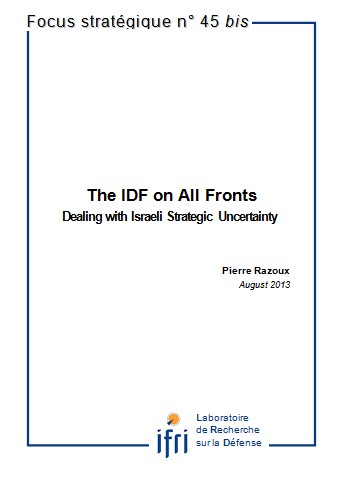The IDF on All Fronts: Dealing with Israeli Strategic Uncertainty

Facing threats on all its borders as well as social, economic and religious tensions, the Israeli Defense Forces (IDF) are now under significant pressure in accomplishing their core mission: the survival of the State of Israel.
While the post-Arab Spring Middle East appears driven by continuing political instability, endemic violence and terrorism, the IDF are attempting to maintain full-spectrum capability in order to respond to a variety of challenges, one at a time or all at the same time if need be. To that end, the IDF are considering both defensive and offensive strategies, the former involving a physical territorial fence, deterrence and missile defense, and the latter involving long-range strikes and raids by special operations forces. To deliver on that ambitious agenda, the IDF need to continue upgrading all their service components - ground forces, air force, navy, and increasingly important cyber force - in a way that is sustainable for both the country’s economy and its society.

Available in:
Regions and themes
ISBN / ISSN
Share
Download the full analysis
This page contains only a summary of our work. If you would like to have access to all the information from our research on the subject, you can download the full version in PDF format.
The IDF on All Fronts: Dealing with Israeli Strategic Uncertainty
Related centers and programs
Discover our other research centers and programsFind out more
Discover all our analysesMapping the MilTech War: Eight Lessons from Ukraine’s Battlefield
This report maps out the evolution of key technologies that have emerged or developed in the last 4 years of the war in Ukraine. Its goal is to derive the lessons the North Atlantic Treaty Organization (NATO) could learn to strengthen its defensive capabilities and prepare for modern war, which is large-scale and conventional in nature.
"Iron Swords" A Military Analysis of Israel's War in Gaza
On October 7, 2023, Hamas' attack, dubbed “Al-Aqsa Flood,” caused a major shock and led Israel to launch the longest war in its history. Operation “Iron Swords” was notable for its unprecedented intensity, both in terms of the massive ground forces deployed and the firepower used.
Saudi Arabia’s Nuclear Temptations. Lessons Learned from Regional Instability
Saudi Arabia’s integration in the international arena and regional stability, notably through reducing its dependence on fossil energies, are crucial elements for the success of the Kingdom’s Vision 2030, the Crown Prince’s top priority. However, Mohammed bin Salman’s declarations in 2018 and 2021, indicating that “if Iran develops a nuclear bomb, we will follow suit as soon as possible”, combined with the recent strikes on key Iranian nuclear facilities, do not bode well for the future of the Kingdom, the region and the non-proliferation regime at large.
The Future of Air Superiority. Command of the Air in High Intensity Warfare
Air superiority, understood as control of the air, is a cornerstone of the Western art of warfare. It is a decisive condition, albeit not sufficient by itself, to achieve military victory, as it enables the concentration of air power toward the achievement of wider strategic objectives and protects other components from unbearable attrition levels. It is best achieved through the offensive use of air power in a joint effort to neutralize the enemy’s air power.










